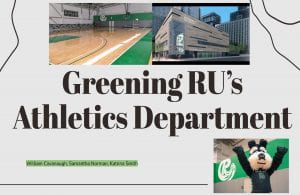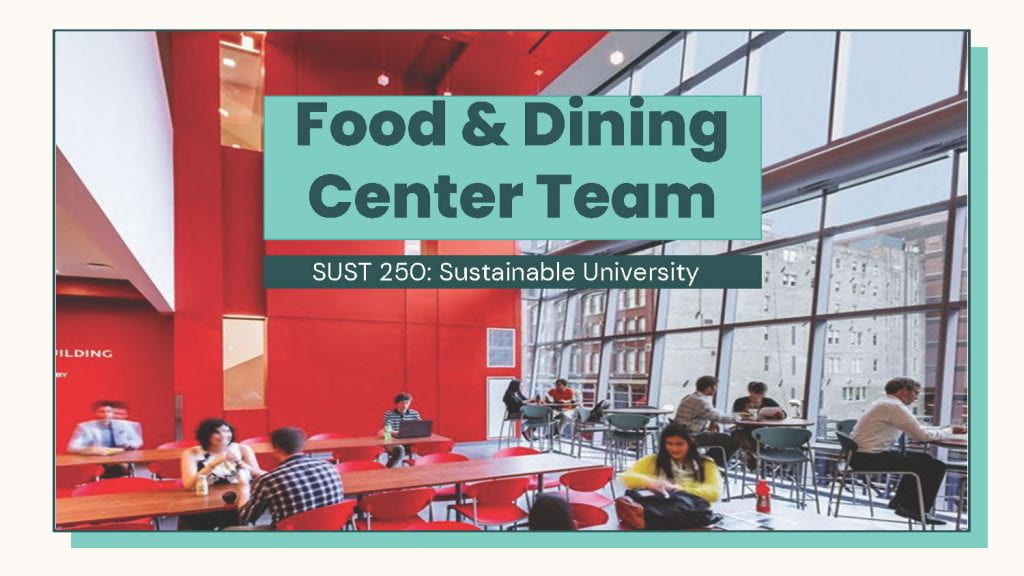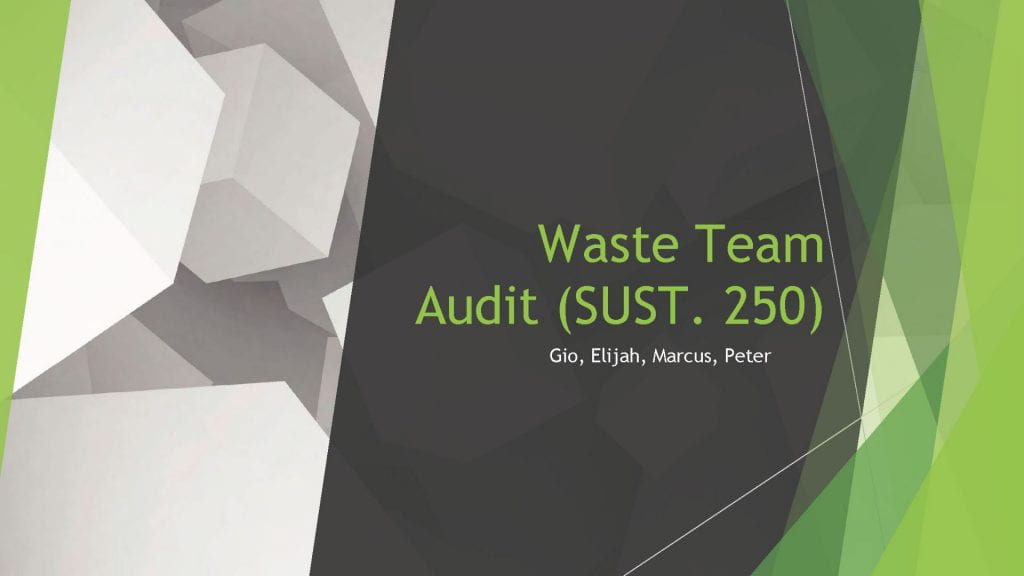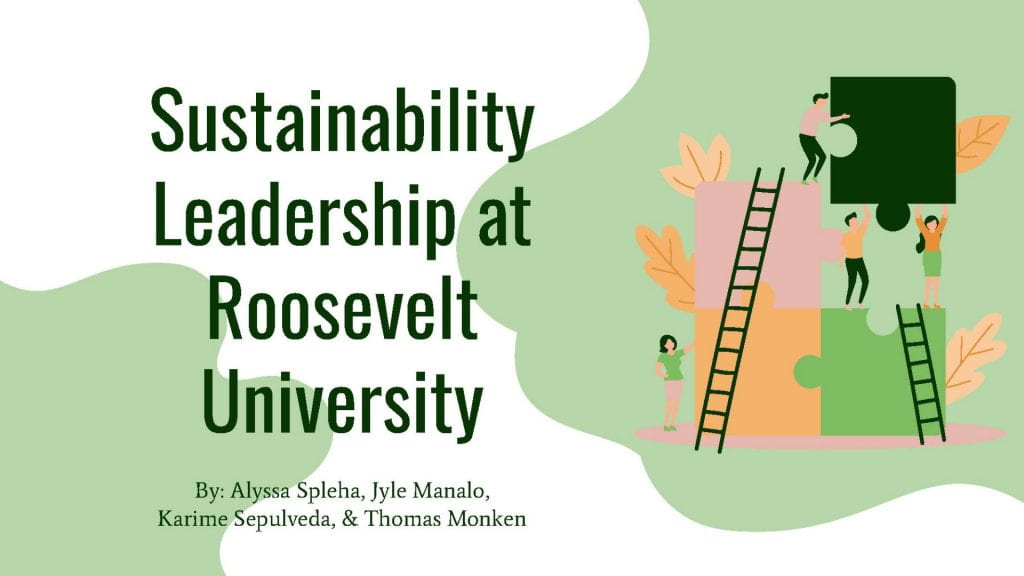by Alyssa Spleha (BA ’22), Sustainability Student Associate 2021-22
The reports are in for Roosevelt University’s SUST 250 Sustainable University course and the results are astounding! Throughout the semester, SUST 250 students have been identifying and tackling some of RU’s sustainability weak spots. Broken up into five teams, the class focused on the athletics department, dining center, student orientation, general waste, and sustainability leadership. Through conducting research and consulting students, faculty, and staff, each team found solutions to major problems, all of which include substantial cost-saving measures.

The Athletics Team tackled four main areas within the department: replacing disposable water cups with reusable water bottles, assessing choices for ethical sourcing of non-game day wear, donating used gear, and conducting future materials audits. By switching to reusable water bottles, the athletics department could save $204-352 per year and reduce their waste immensely. In addition, the team found that by donating old gear, the university could write that value off on its taxes.
The Food and Dining Team focused on reducing dining center waste and explored the option of reusable dining ware. One of the main issues they identified was the lack of labeling on the disposable dining ware as well as the lack of labeling on trash receptacles throughout the cafeteria. By switching to reusable dining ware, not only is it much easier for diners to properly dispose of their waste, but it will save the dining center a whopping $58,866 in the first year and an even more impressive $65,500 per year thereafter. (Remember that number!) Moreover, giving new students a set of their own dining ware to reuse again and again will reduce theft and greatly reduce waste.
The Student Orientation Team wanted to promote awareness of sustainability to new and transfer students by creating a PowerPoint presentation and a comical skit for the orientation team to present to incoming students each semester. With this presentation, incoming students will be well-versed in the basics of sustainability and Orientation Leaders can promote good waste-reduction habits. If all students collectively reduce their waste, it will save RU money in annual disposal fees and more importantly reduce the university’s greenhouse gas (GHG) emissions.
The Waste Team had the pleasure of conducting a waste audit of a heavily used disposal area in the dining center. They first conducted a pre-audit by weighing each waste bag collected from these receptacles: trash, recycling, and compost. Then, by further inspecting the contents of each bag, they discovered that an alarming proportion of compostables was being thrown in the trash. More specifically, over 90% of the trash by weight was compostable. They further found that the lack of labeling on packing items students to unknowingly throw out recyclable and compostable materials instead of properly disposing of them, despite the presence of recycling and compost bins throughout the campus. The team concluded that taking away unlabeled bins would encourage students to properly sort through their trash at the designated trash-sorting areas.
Last but not least, the Sustainability Leadership Team examined the accomplishments of past and present sustainability leaders at RU to make a case for why RU needs a designated sustainability coordinator on staff. Not only would a sustainability coordinator stay on top of reporting our sustainability efforts, but they would be able to write grants, create positive PR through green certifications, and implement cost-saving projects such as all the ones listed above. Just implementing the recommended switch to reusable dining ware in our cafeteria would generate more than enough annual savings to fund a full-time sustainability coordinator as part of the university’s operating budget — a staff person who in turn would identify other areas of savings as well as revenue generation.
In addition, implementing a “green fee” of $5 per semester per student could generate approximately $33,070/year to be used on specific sustainability projects such as creating a climate action plan, implementing student-led projects, offering professional development for faculty and staff, and much more. Besides these cost-savings, the team noted that supporting sustainability-related commitments to reduce carbon emissions, minimize waste, and promote environmental and social justice — all of which would be led and supported by a sustainability coordinator — is an ethical obligation of the university as well as a key fulfillment of its 2015-20 Strategic Sustainability Plan‘s goals and recommendations.
All in all, the students of SUST 250 each identified areas within the university that can be improved and would save the university tens of thousands of dollars every year. Beyond these remarkable cost-savings, though, as a social justice-oriented institution we are ethically obligated to prioritize projects such as these. By having a sustainability coordinator guiding these projects, the possibilities and savings far outweigh the initial upfront costs.
Want More? Watch these Zoom Videos of the SUST 250 Team Presentations:
Topic: SUST 250 Campus Sustainability Symposium 2022 (Food/Dining and Student Orientation) Date: Apr 19, 2022 10:50 AM Central Time (US and Canada)
Meeting Recording: https://roosevelt.zoom.us/rec/share/PdNsQwc_flzTfM0D_4n3XMK7NE1lChxIKRFcwtxiRBy4hPDjKrpSSsge6wswYiPS.v__yiQoTNZstY3Oj
Topic: SUST 250 Campus Sustainability Symposium 2022 (Athletics, Leadership, and Waste) Date: Apr 21, 2022 10:51 AM Central Time (US and Canada)
Meeting Recording: https://roosevelt.zoom.us/rec/share/1gI5wq2lmT2jCybabzwYcds6FjpEmIix8iNCvgthSqAxsYSKc2NJXCyEg65DwEDG.mfue7NiK8swvZ5Us




